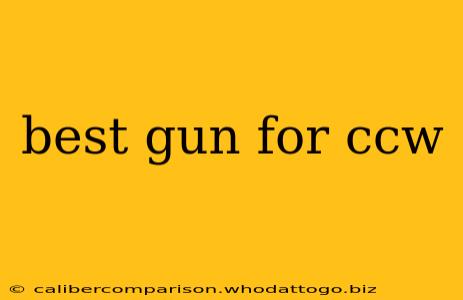Choosing the best gun for concealed carry (CCW) is a deeply personal decision, heavily influenced by individual factors like hand size, physical build, experience level, and lifestyle. There's no single "best" gun; the ideal choice depends entirely on your specific needs and preferences. This guide will walk you through the key considerations to help you make an informed decision.
Key Factors to Consider When Choosing a CCW Gun
Before diving into specific models, let's examine the crucial factors determining the suitability of a firearm for concealed carry:
1. Caliber: Balancing Power and Control
Caliber selection involves weighing firepower against recoil and ammunition capacity. Popular CCW calibers include:
- 9mm: A widely popular choice, offering a good balance of stopping power, manageable recoil, and high magazine capacity. Ammunition is readily available and relatively inexpensive.
- .45 ACP: Provides significant stopping power, but with more substantial recoil. Magazine capacity is typically lower than 9mm.
- .380 ACP: A smaller caliber with less recoil, making it suitable for smaller individuals or those new to firearms. However, stopping power is reduced compared to 9mm or .45 ACP.
- .40 S&W: Falls between 9mm and .45 ACP in terms of power and recoil. While effective, its popularity has decreased somewhat in recent years.
The best caliber for you depends on your comfort level with recoil and your priorities regarding stopping power versus ammunition capacity.
2. Size and Weight: Concealability and Comfort
Concealed carry demands a firearm that is comfortable and easily concealable. Consider:
- Grip Size: A grip that fits your hand comfortably is crucial for accurate shooting and control. Too large or too small a grip can compromise your ability to handle the weapon effectively.
- Overall Size: The overall dimensions of the gun must be appropriate for your body type and clothing. Smaller guns are generally easier to conceal but may offer less capacity.
- Weight: Carrying a heavy gun all day can be tiring and uncomfortable. A lighter gun will be more comfortable for extended periods.
Experiment with different firearm sizes and weights at a shooting range to find what feels best for you.
3. Reliability and Durability: Performance Under Pressure
Your CCW firearm needs to function flawlessly under pressure. Look for a gun known for its reliability and durability. Research reviews and consider the reputation of the manufacturer. Regular maintenance and cleaning are also essential for maintaining reliability.
4. Features: Enhancing Safety and Usability
Certain features can significantly improve safety and usability:
- Safety Mechanisms: Understand the different types of safety mechanisms (e.g., grip safety, manual safety, trigger safety) and choose a design that you're comfortable and confident using.
- Sights: Good sights are essential for accurate shooting, especially in stressful situations. Consider night sights for low-light conditions.
- Ergonomics: The overall design of the gun should feel natural and comfortable in your hand.
5. Ammunition Availability and Cost: Practical Considerations
Ensure that the ammunition for your chosen caliber is readily available and reasonably priced. The cost of ammunition can add up over time, so this is a practical aspect to consider.
Popular CCW Gun Choices (Examples, Not Endorsements)
While specific model recommendations are highly individual, some frequently chosen CCW firearms include various models from manufacturers like Glock, Smith & Wesson, SIG Sauer, Springfield Armory, and Ruger. Researching these manufacturers' offerings within the calibers discussed above will give you a starting point. Always handle and test-fire any firearm before purchasing it.
Training and Practice: Essential for Safe and Effective CCW
Regardless of the gun you choose, comprehensive training is absolutely critical. Proper training covers safe handling, marksmanship, legal aspects of carrying a concealed weapon, and situational awareness. Regular practice is equally important to maintain proficiency and build confidence.

